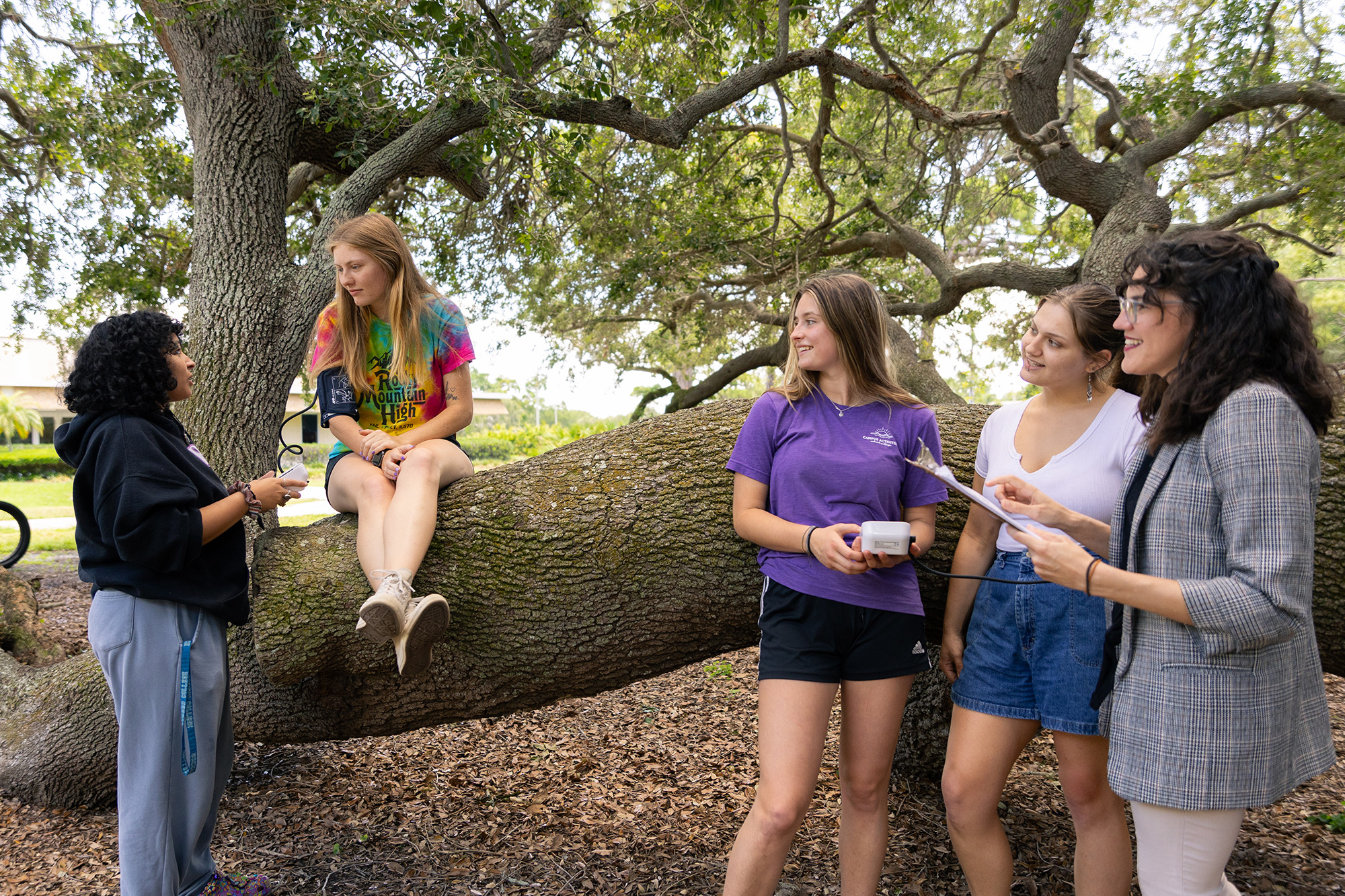Building on an already robust curriculum, Eckerd College recently added a public health minor to its list of 54 minors available to students beginning in the Fall 2024 semester.
According to Sarah Lyle, Ph.D., assistant professor of psychology and a coordinator of the public health minor, the program “is designed to provide a preprofessional background for students interested in careers in public health, medicine, healthcare administration, health education, epidemiology and related fields.”
Lyle adds that “throughout their coursework, students will develop critical-thinking skills essential for analyzing health data, communication skills needed for collaborating with varying audiences, cultural awareness necessary for working with diverse populations across the globe, and a comprehensive understanding of the social determinants of health. The minor will equip students with the knowledge and skills necessary to address complex health challenges and contribute meaningfully to the improvement of human health outcomes.”
The new minor will be housed in, and coordinated by faculty in, the Behavioral Sciences Collegium. Lisa Miller, Ph.D., associate professor of sociology, will serve as the primary coordinator for the minor, while Lyle will serve as a secondary coordinator.
“It has long occurred to me that we should have a public health minor at Eckerd College and that we should do more to train our students with interests in health-related careers,” Miller explains. “Health-related careers are actually the fastest growing sector of the labor market today. So my hope is that this minor will do more to provide training to students who want to pursue this career path, which is a shared goal among the faculty who teach a health-related class on campus.”
Eckerd’s minor in public health requires five courses: Foundations of Public Health, a Statistics course and three approved electives.
The first Foundations class is now enrolling for Fall 2024. Miller and Lyle curated the public health minor—relying on existing health-related courses from a variety of disciplines such as anthropology, biology, psychology, sociology and computer science—to give students options on electives.
“Students who wish to pursue the minor can take a wide variety of health-related electives across campus,” Lyle says. “For example, they can take a course titled Environmental Health in environmental studies to better understand how environmental hazards compromise the state of population health. Or they could opt to take Health Disparities in psychology if they are interested in better understanding social determinants of health, including how social inequality shapes health outcomes.”
“There are even two courses from computer science that we are including for credit toward the minor,” Lyle adds. “One is Python for Biology and Life Sciences, and the second one is Data Science Fundamentals. Both of these classes are really helpful, and they give the hands-on health-data management and analysis skills that some public health fields require.”
As for student interest in this new minor, excitement is already building. Clare Wurlitzer, a rising-senior psychology student from Buzzards Bay, Massachusetts, learned of the new offering when she took Lyle’s Health Psychology class during the 2024 spring semester. “When Dr. Lyle told us about the public health minor, I was very interested in pursuing it because public health is something that everyone should be interested in …,” Clare says. “Since COVID-19, I knew that I wanted to learn more about how society and people deal with health and how quickly people can change their views on health.
“I have family friends who work in the healthcare field,” she adds, “and watching them and learning about the behind-the-scenes experiences makes me look up to them and the sacrifices they make to keep people healthy and safe.”
Nadia Plechaty, a senior sociology student from Littleton, Colorado, says she’s been interested in public health ever since she took Miller’s Health, Aging and Society class as a first-year student. “My passion really lies in public health issues related to reproductive and sexual health,” Nadia explains. “I spoke with Dr. Miller about possible job and internship opportunities in the field, and relative coursework that already existed at Eckerd that I could take to allow me to study it.
“I have taken many health-related courses at Eckerd and have off-campus experience with organizations like Planned Parenthood, Progress Florida, and Metro Inclusive Health—thanks to Dr. Miller’s mentoring. I even studied abroad in Ghana to do a public health internship, research and take classes at the University of Ghana to get more experience and education in the field before applying for a master’s degree.
“Now that the minor is finally offered at Eckerd,” Nadia adds, “having it will help me tremendously in applying to Master of Public Health programs. I am applying to schools like Columbia, Johns Hopkins, Boston University, UNC [University of North Carolina] Chapel Hill and others. I am so excited to take the intro course for the minor with Dr. Miller and see where this minor goes at Eckerd.
“And I’m also so proud of both Dr. Miller and Dr. Lyle for getting this minor up and running. I am close with both of them and know they will do an outstanding job mentoring students through it.”














